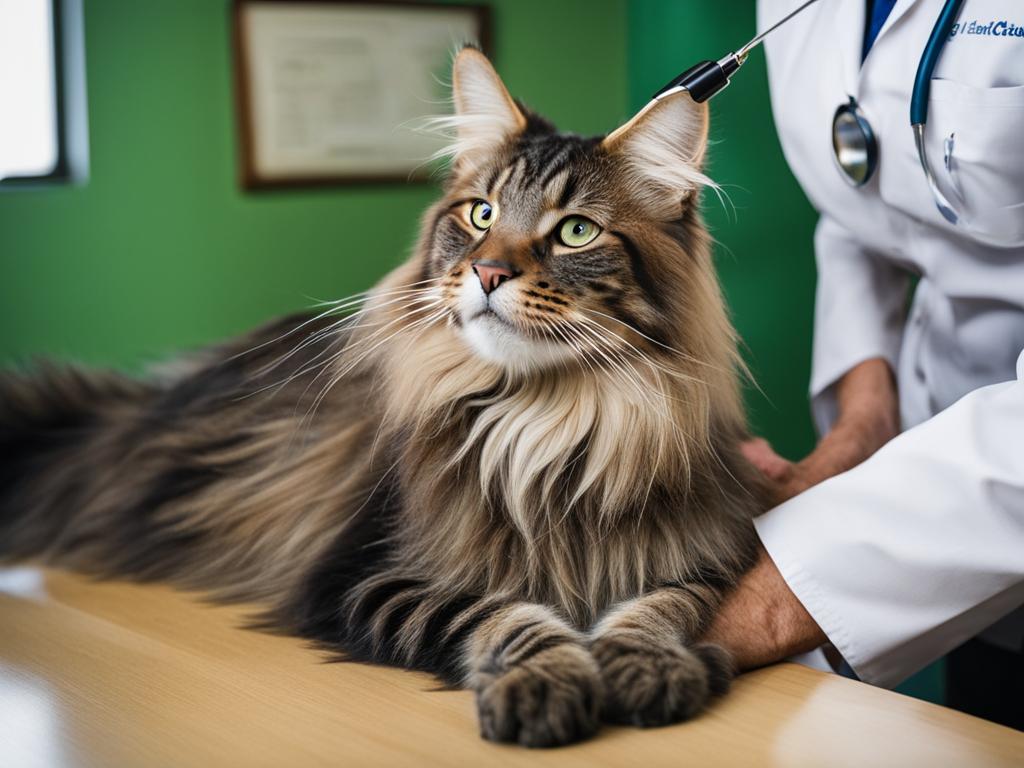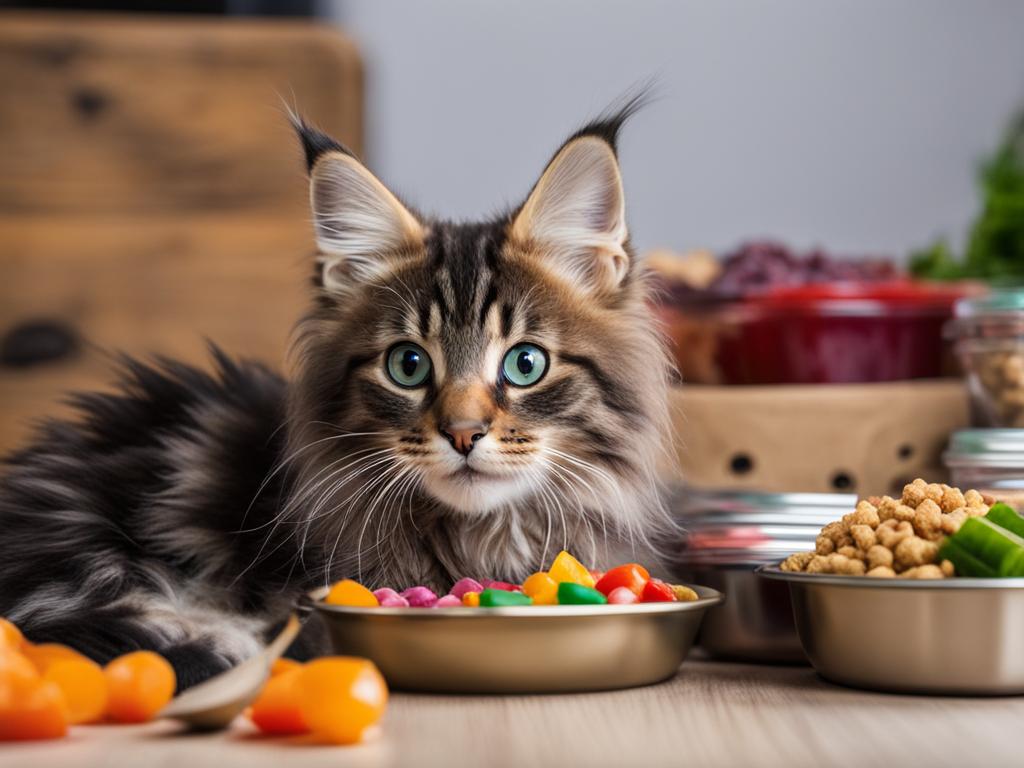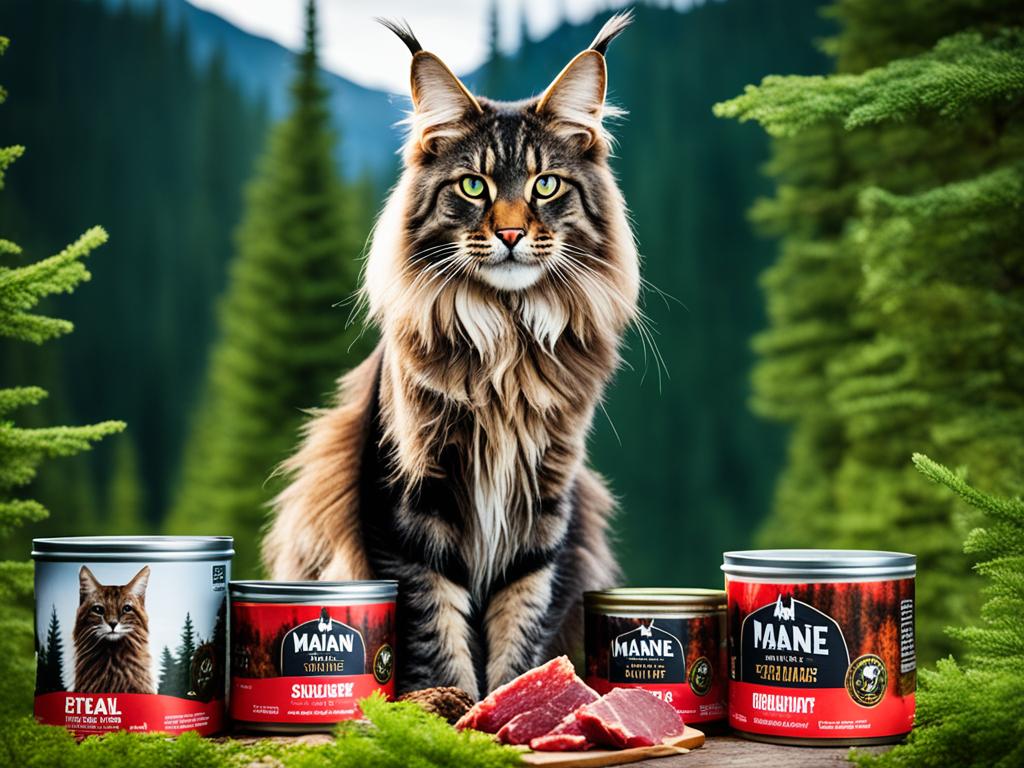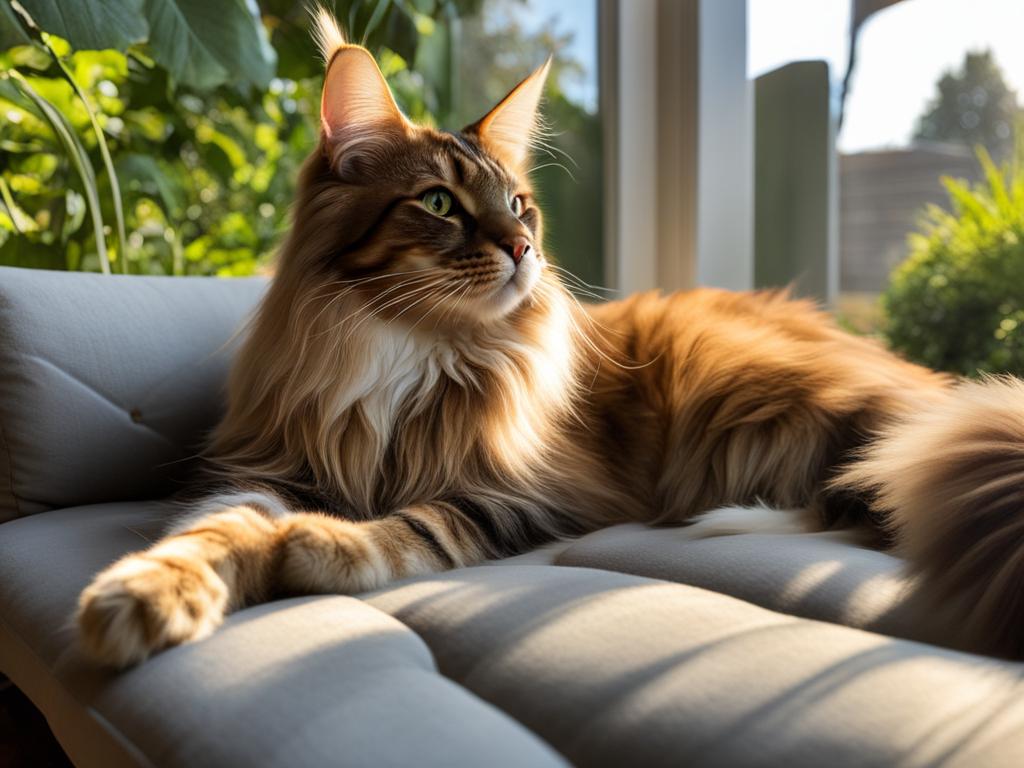Maine Coons are sociable, family-friendly cats that require basic care to keep them healthy and happy. This article provides essential tips for Maine Coon cat care, including information on grooming, exercise, feeding, and health. Whether you’re a new Maine Coon parent or an experienced owner, these tips will help you ensure the well-being of your majestic feline companion.
Key Takeaways:
- Regular grooming is crucial for Maine Coons due to their long, thick coats.
- Maine Coons are intelligent and trainable, so engage in fun and interactive playtime activities.
- Proper nutrition is vital, with a focus on high-quality meat-based diets.
- Regular veterinary check-ups are essential to monitor their health and identify any potential issues.
- Maintaining a healthy weight through exercise and portion control helps prevent obesity-related health problems.
Maine Coon Care Basics
While Maine Coons are relatively low-maintenance, there are some essential care needs to consider. Whether you have an indoor or outdoor Maine Coon, it’s important to provide them with the proper care to ensure their health and well-being.
Maine Coon Outdoor Activities
Maine Coons are natural explorers and love to indulge in outdoor activities. However, it’s crucial to be aware of the potential risks and health issues associated with their outdoor adventures. Here are a few important considerations:
- Provide a safe and secure outdoor space for your Maine Coon to roam and play.
- Make sure your yard is free from harmful substances or plants that could be toxic to your cat.
- Keep them protected from outdoor dangers such as traffic, predators, and extreme weather conditions.
- Regularly check for ticks, fleas, and other parasites that may attach themselves to your cat during outdoor activities.
- Ensure your Maine Coon is up-to-date on vaccinations and preventive treatments to minimize the risk of diseases.
By taking these precautions, you can provide your Maine Coon with a safe and enjoyable outdoor experience.
Maine Coon Grooming
Grooming is an essential aspect of Maine Coon care, especially due to their long, luxurious coats. Regular grooming sessions not only keep their fur clean and untangled but also help prevent matting and reduce shedding. Here are some key grooming tips:
- Brush your Maine Coon’s coat at least once a week using a suitable cat brush.
- Pay extra attention to areas prone to matting, such as the belly and behind the ears.
- Consider using a detangling spray or specialized grooming tools to ease the process.
- Trim your cat’s nails regularly to prevent them from becoming overly long or sharp.
- Consult a professional groomer for assistance if needed.
By incorporating regular grooming into your Maine Coon’s routine, you can maintain their coat’s health and appearance.
Maine Coon Behavior
Understanding your Maine Coon’s behavior and tendencies is key to creating a safe and comfortable environment for them. While Maine Coons are known for their friendly and sociable nature, they may exhibit certain behaviors and interact differently with strangers. Here are a few aspects to consider:
- Maine Coons are generally more tolerant of strangers compared to other cat breeds, but they still appreciate their personal space and may need time to warm up to new people.
- They enjoy interactive play and mental stimulation, so provide plenty of toys and engage in activities that keep them mentally and physically engaged.
- Maine Coons are known for their intelligence, so consider taking advantage of their cognitive abilities by incorporating puzzle toys or training sessions into their routine.
- Observe your Maine Coon’s body language to better understand their moods and emotions.
By understanding and respecting your Maine Coon’s behavior, you can create a harmonious environment that meets their unique needs.
Maine Coon Care and Training
Maine Coons are highly intelligent and trainable cats. With their playful nature, they can be easily trained to engage in interactive games like fetch, tag, and hide and seek. Starting the training process when they are kittens and using positive reinforcement, such as treats, can make the training experience enjoyable for both you and your Maine Coon.
Regular playtime and mental stimulation activities are essential for stimulating the intelligence of Maine Coons. Engaging in interactive play sessions not only provides physical exercise but also helps keep them mentally stimulated and entertained. Activities that encourage exploration, problem-solving, and hunting instincts can help satisfy their natural curiosity and intelligence.
Here are some playtime and mental stimulation activities that are perfect for Maine Coons:
- Interactive puzzle toys that require problem-solving skills to obtain treats or toys
- Feather toys or laser pointers to engage their hunting instincts
- Play tunnels or hiding spots to simulate their natural environment
- Rotate toys regularly to keep them engaged and prevent boredom
Additionally, dedicating a few minutes each day to training sessions can have a significant impact on your Maine Coon’s behavior and intelligence. Use positive reinforcement techniques, such as treats or praise, to reward desired behaviors and gradually increase the difficulty of the training exercises.
Training Tips for Maine Coons:
- Start with basic commands like sit, stay, and come
- Keep training sessions short and fun to avoid stress or frustration
- Be patient and consistent with your training approach
- Use clear and simple cues to communicate with your Maine Coon
- Reward good behavior immediately to reinforce positive habits
Remember, every Maine Coon is unique, and their learning pace may vary. Celebrate small achievements and be understanding if they need more time to grasp certain commands or tricks.
Playing and training with your Maine Coon not only strengthens the bond between you and your feline friend but also provides them with the mental stimulation they need to thrive. Use playtime and training sessions as opportunities to challenge their intelligence, foster their natural instincts, and enrich their lives.
Looking After a Maine Coon’s Health
Maine Coons are generally healthy cats, but it’s important to be aware of potential health issues that they may be prone to. By understanding these conditions and taking proactive measures, you can ensure the well-being of your beloved Maine Coon. This section will discuss two common health issues in Maine Coons, namely hip dysplasia and hypertrophic cardiomyopathy, as well as the importance of weight management for their overall health.
Hip Dysplasia in Maine Coons
Hip dysplasia is a genetic condition that affects the hip joint, causing weakness, pain, and difficulty in mobility. While all cats can be affected by hip dysplasia, Maine Coons have a higher prevalence due to their larger size. Regular weight management is crucial for Maine Coons, as excessive weight can worsen the condition. A balanced diet and portion control are essential components of weight management. It’s important to consult with your veterinarian to determine the appropriate diet plan for your Maine Coon’s specific needs.
Hypertrophic Cardiomyopathy (HCM)
Maine Coons are also prone to hypertrophic cardiomyopathy, a genetic heart condition characterized by thickening of the heart’s muscular wall. HCM can lead to heart arrhythmia, heart failure, and other serious complications. Regular veterinary check-ups and heart health monitoring are vital for early detection and management of HCM. Your veterinarian may recommend diagnostic tests such as echocardiography to assess your Maine Coon’s heart health. Maintaining a healthy weight through proper nutrition and exercise can help reduce the risk of heart-related issues.
Weight Management for Maine Coons
Maintaining a healthy weight is essential for the overall health and well-being of Maine Coons. Obesity can lead to various health problems, including joint issues, diabetes, and cardiovascular diseases. Proper nutrition, portion control, and regular exercise are key to managing your Maine Coon’s weight. Feeding a high-quality diet specifically formulated for Maine Coons can help fulfill their nutritional needs without excess calories. Consult with your veterinarian to determine the appropriate feeding guidelines and exercise routine for your Maine Coon based on their age, body condition, and activity level.
| Health Issue | Description | Preventive Measures |
|---|---|---|
| Hip Dysplasia | A genetic condition affecting the hip joint, causing weakness and pain. |
|
| Hypertrophic Cardiomyopathy | Genetic heart condition characterized by thickening of the heart’s muscular wall. |
|
| Weight Management | Maintaining a healthy weight to prevent obesity-related health problems. |
|
Regular veterinary care, including vaccinations, parasite prevention, and routine check-ups, is crucial for maintaining your Maine Coon’s overall health. By prioritizing their well-being and addressing any potential health issues, you can ensure that your Maine Coon leads a happy and healthy life.

How to Care for a Maine Coon’s Nutrition
Proper nutrition is crucial for the overall health and well-being of your Maine Coon. As carnivorous cats, Maine Coons have specific dietary needs that should be met to ensure their optimal health.
Maine Coon nutrition should consist of a diet rich in animal proteins. Look for high-quality cat foods that contain meat or fish as the primary ingredients. These protein sources are essential for supporting your Maine Coon’s muscular structure and maintaining their energy levels.
Avoid foods that contain grains, fillers, or artificial additives as these can be harmful to your Maine Coon’s health. Stick to natural cat food options that prioritize whole ingredients and avoid unnecessary fillers.
In addition to protein, your Maine Coon’s diet should include moderate amounts of fat and minimal carbohydrates. Fat provides a concentrated source of calories and helps to maintain a healthy weight. Carbohydrates should be limited as cats do not require them for their nutritional needs.
By feeding your Maine Coon a meat-based diet that aligns with their natural dietary preferences, you can support their overall health and well-being. A balanced and nutritious diet is essential for preventing health issues such as urinary tract infections and gastrointestinal disorders.

Recommended Nutritional Guidelines for Maine Coons
| Nutrient | Recommended Amount |
|---|---|
| Animal Protein | 45-50% |
| Fat | 15-20% |
| Carbohydrates | 5-10% |
| Water | Always available |
Consult with your veterinarian to determine the specific nutritional needs of your Maine Coon and to ensure you are providing them with a balanced diet. They may recommend specific cat food brands that are formulated to meet the nutritional requirements of Maine Coons.
Untamed: The Ideal Food for Maine Coon Cats
When it comes to feeding your Maine Coon, providing the right nutrition is crucial for their overall health and well-being. That’s where Untamed cat food comes in. Designed specifically for Maine Coon cats, Untamed offers a premium range of cat food that meets their unique dietary needs.
Untamed’s recipes are formulated by veterinarians to provide the perfect balance of nutrition for Maine Coon cats. Their cat food contains high levels of quality meat or fish, with twice the amount of animal protein found in regular commercial cat food. This high protein content is essential for the growth and maintenance of your Maine Coon’s muscles.
What sets Untamed apart is their commitment to using gentle cooking and production methods that ensure the preservation of essential nutrients. By carefully selecting ingredients and using precise cooking techniques, Untamed cat food retains the natural flavors and nutritional value that Maine Coon cats require.
But it’s not just about the exceptional nutrition. Untamed is also dedicated to being an ethical manufacturer. They source their ingredients from cruelty-free suppliers and use 100% recyclable packaging, reducing their impact on the environment.
Feeding your Maine Coon Untamed cat food not only supports their health and overall well-being, but it also gives you the peace of mind that you’re providing them with the best possible nutrition.

Untamed Cat Food Features at a Glance
| Key Features | Description |
|---|---|
| Premium Quality | Untamed cat food offers a premium quality formulation with high levels of meat or fish, meeting the specific dietary needs of Maine Coon cats. |
| High in Animal Protein | Untamed cat food contains twice the amount of animal protein compared to regular commercial cat food, promoting healthy muscle development and maintenance. |
| Gentle Cooking Methods | Untamed’s gentle cooking methods preserve essential nutrients, ensuring that your Maine Coon receives the full benefits of the quality ingredients used in their cat food. |
| Ethical Manufacturing | Untamed is committed to being an ethical manufacturer, sourcing ingredients from cruelty-free suppliers and using 100% recyclable packaging. |
Tips for Grooming Your Maine Coon
Grooming is a crucial aspect of Maine Coon care, especially due to their long, thick coats. Regular brushing helps prevent mats and reduces shedding. Using a soft brush and starting grooming sessions when they are young will make the experience more enjoyable for your Maine Coon. Additionally, consider incorporating a monthly bath and regular nail trimming into their grooming routine. Taking proper care of their coat and nails will help keep them healthy and prevent hairballs and other grooming-related issues.
Proper Brushing Techniques
To effectively groom your Maine Coon, it’s important to use the right brushing techniques. Start by brushing in the direction of hair growth, using gentle strokes to remove tangles and loose fur. Pay close attention to areas prone to matting, such as the chest, underarms, and belly. Use a wide-toothed comb or a slicker brush to gently untangle any knots or mats.
Tip: Invest in a high-quality grooming tool, such as a stainless steel comb or a slicker brush with fine bristles, specifically designed for long-haired cats like the Maine Coon.
Bathing Your Maine Coon
Although Maine Coons are generally known for their cleanliness and self-grooming abilities, a monthly bath can help keep their coat in optimal condition. Use a gentle cat shampoo that is specifically formulated for sensitive skin. Ensure the water is lukewarm and avoid getting water in their ears and eyes. After bathing, thoroughly dry your Maine Coon using a towel or a pet blow dryer on a low heat setting.
Trimming Nails
Regular nail trimming is essential to prevent your Maine Coon’s nails from becoming too long or sharp. Use a pair of cat nail clippers or nail trimmers with a circular blade, designed specifically for cats. Take extra care not to trim the quick, the pinkish vein inside the nail, as it may cause bleeding and discomfort. If you are unsure about trimming your Maine Coon’s nails, consult a professional groomer or your veterinarian for guidance.
Tip: Consider using a scratching post or a scratching pad to help maintain your Maine Coon’s nail length naturally.
Preventing Hairballs
Maine Coons are prone to hairballs due to their long, thick coats and self-grooming habits. Regular brushing helps reduce the amount of loose fur your Maine Coon ingests during grooming, minimizing the risk of hairballs. Additionally, incorporating a hairball prevention supplement or feeding a specialized hairball control diet can help reduce hairball formation.
Maintaining a Healthy Coat
Providing your Maine Coon with a balanced diet that is rich in essential nutrients, such as omega-3 fatty acids, will help promote a healthy coat. Omega-3 fatty acids, found in fish oil supplements or certain cat foods, contribute to healthy skin and a lustrous coat. Consult your veterinarian for dietary recommendations specific to your Maine Coon’s needs.
The Importance of Mental Stimulation for Maine Coons
Maine Coons are highly intelligent cats that require mental stimulation to keep them happy and fulfilled. Just like humans, these majestic feline companions need activities that engage their minds and prevent boredom. One way to provide mental stimulation is by offering interactive toys that challenge their problem-solving skills. Puzzle feeders are also a great option, as they encourage Maine Coons to work for their food, keeping their minds sharp and focused.
In addition to toys and puzzle feeders, playtime activities that mimic their natural hunting instincts are essential for mental stimulation. Maine Coons have a strong prey drive and enjoy the thrill of the chase. Engaging them in games like chasing toys or playing hide and seek not only keeps them mentally engaged but also provides them with physical exercise. This combination of mental and physical stimulation is vital for their overall well-being.
Remember, Maine Coons are social cats that thrive on human interaction. Regular playtime sessions with their owners create a bond and provide them with mental stimulation. Take the time to play with your Maine Coon and provide them with the attention they crave. This bonding experience strengthens your relationship while fulfilling their need for mental stimulation.
FAQ
How often should I groom my Maine Coon?
Regular grooming is necessary for Maine Coons due to their long coats. It is recommended to brush their fur at least two to three times a week to prevent matting and reduce shedding.
Can Maine Coons be kept as indoor cats?
While Maine Coons enjoy the outdoors, they can also live happily as indoor cats. As long as you provide them with plenty of toys, scratching posts, and opportunities for exercise, they can thrive in an indoor environment.
How can I train my Maine Coon to play interactive games?
Maine Coons are intelligent and trainable cats. Start training them when they are kittens using positive reinforcement, such as treats and praise. Interactive games like fetch, tag, and hide and seek can be easily taught to engage them.
What health issues are common in Maine Coons?
Maine Coons may be prone to hip dysplasia, a genetic condition that affects the hip joint, and hypertrophic cardiomyopathy, a heart condition. Regular vet check-ups and weight management are essential for their overall health.
What should I feed my Maine Coon?
Maine Coons require a diet rich in animal proteins. High-quality cat foods that contain meat or fish as primary ingredients are ideal. Avoid foods with grains, fillers, or artificial additives that can be harmful to their health.
What is Untamed cat food and is it suitable for Maine Coons?
Untamed is a premium cat food brand specifically designed for Maine Coon cats. It provides the perfect balance of nutrition for their specific needs, with high levels of meat or fish and essential nutrients. Feeding your Maine Coon Untamed cat food can support their health and overall well-being.
How often should I bathe my Maine Coon?
Maine Coons generally do not require frequent baths unless they get excessively dirty. However, a monthly bath can help keep their coat clean and healthy. Regular brushing and nail trimming should also be part of their grooming routine.
How can I mentally stimulate my Maine Coon?
Maine Coons thrive on mental stimulation. Provide them with interactive toys, puzzle feeders, and engage in playtime activities that mimic their natural hunting instincts. Keeping them mentally engaged will contribute to their overall happiness and well-being.

Leave a Reply